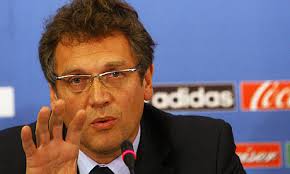By Andrew Warshaw, Chief Correspondent
February 28 – FIFA secretary general Jérôme Valcke says the organisation has not received a shred of firm proof that Qatar broke any rules in securing their shock 2022 World Cup ballot victory.
One month after a 20-page expose headlined ‘Qatargate’ in the respected magazine France Football heaped pressure back on the tiny Gulf state by questioning the way it upset the odds when acquiring the World Cup, Valcke said FIFA is still waiting for proper evidence of wrongdoing.
France Football claimed “acts of collusion and corruption” helped secure the competition for Qatar, which beat off strong competition from the United States, South Korea, Japan and Australia in December, 2010.
The magazine alleged Qatar paid over $1m each to a number of FIFA voters and also suggested UEFA president Michel Platini, who voted for Qatar, had been pressurized into doing so by then French President Nicolas Sarkozy, an accusation Platini has fiercely rejected.
“We have never received a shred of evidence or any suspicion of corruption cases in 2018 (Russia) or 2022,” Valcke told France Football’s sister publication, the daily sports paper l’Equipe in an interview this week.
“If we knew, at FIFA, whether the president, the general secretary or any other person, that there was something, do you think we would have overlooked it? How can one imagine that we could take the risk that, if there were the slightest piece of information about corruption, we would not disclose it?”
In 2011, a private leaked email from Valcke suggested Qatar had “bought” the World Cup. Although he confirmed its existence, Valcke said he meant simply that Qatar had the funds to mount a perfectly legal full-scale lobbying operation.
FIFA’s ethics commission has pledged to investigate any fresh evidence as part of the ongoing reform process but Valcke’s comments suggest Qatar will be on safe territory when the reform package is put to the vote at the FIFA Congress in May.
France Football’s exposé centred on what it claimed were suspicious activities surrounding Qatar’s campaign but Valcke said they represented little more than hearsay.
“For the whole process of the attribution of the 2018 and 2022 World Cups, FIFA put in place a system of checks to ensure the candidates responded in a manner that was the most transparent possible,” he said. “If there is corruption, proof is needed. Those who are talking about it have to provide proof. If that’s the case the ethics commission will intervene.”
Ever since they won the bid, Qatari officials have insisted everything was done by the book, repeatedly bemoaning what they believe is a smear campaign against the oil-rich state which has little or no pedigree in international football and is half the size of Wales.
This correspondent has spent many a long hour in the company of Qatar 2022 officials who are hurt by some of the criticism but are collectively determined not to lose focus as they press ahead with developing the necessary infrastructure.
FIFA officials nevertheless admit that the simultaneous ballot for the 2018 and 2022 tournaments was a flawed idea after two executive committee members were suspended before the vote following a British newspaper investigation into alleged vote-trading.
Contact the writer of this story at moc.l1743718654labto1743718654ofdlr1743718654owedi1743718654sni@w1743718654ahsra1743718654w.wer1743718654dna1743718654

